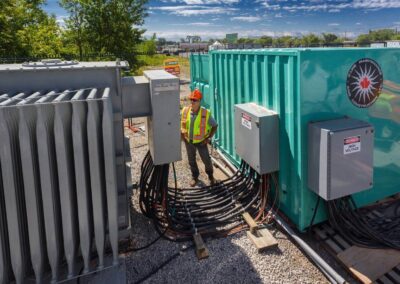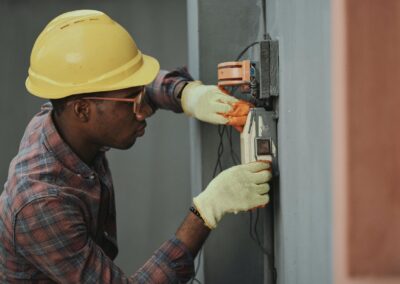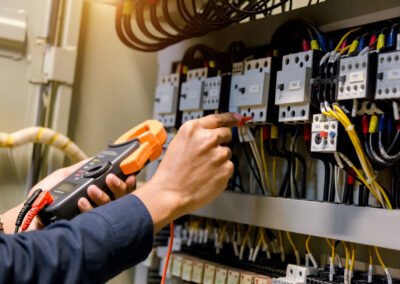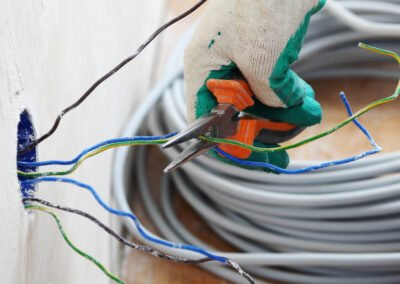Mobile Commercial Wiring, Vaughan
Though electrical wiring in a residential facility is a fairly straightforward procedure, wiring for a commercial property is usually more complex, and requires the expertise of a skilled and knowledgeable electrician.
Request InformationSchedule Service
Mobile Commercial Wiring, Vaughan
Electrical wiring is no different from other electrical projects in that safety should always come first. Electrical wiring can be a complicated undertaking for both commercial and residential buildings. To execute the project securely and in accordance with the Electrical Safety Authority’s (ESA) electrical code, it is best left to the knowledge and experience of a qualified electrical contractor. Although performing electrical work in residential and commercial areas is comparable, wiring in commercial spaces requires extra care since the wiring must be set up to compensate for any heavy equipment or machinery needed within the space.
Cable assemblies, raceways and conductors, and busways are the three primary techniques for electrical wiring in commercial structures.
Cable Assemblies
When it comes to electrical wiring in a commercial environment, the utilization of a cable assembly is quite frequent. The equipment grounding conductor in cable assemblies often contains numerous insulated and neutral phase conductors. Custom cable assemblies are available and typically use copper or aluminium conductors that are either THHN/THWN (thermoplastic high heat-resistant nylon jacket) or XHHW-2 (XLPE high heat-resistant and water-resistant nylon jacket).
Utilizing cable assemblies has a few benefits over conventional wiring techniques, including flexible cable routing, less installation costs, and quicker installation times. However, the inability to alter the circuit layout once it has been placed has the drawback of necessitating greater preparation during the installation process.
Raceways and Conductors
Another frequently used method is the raceway and conductor technique. Typically, a tube or conduit with an equipment grounding conductor and numerous insulated phases is used when using raceways and conductors. The actual design and installation will vary based on the demands and requirements of the commercial property, as with any form of electrical project. The most popular conductor types, like cable assemblies, are copper/aluminum THHN/THWN or XHHW. Typically, feeders are made of aluminium while branch circuits are made of copper.
When compared to the cable assembly approach, raceways and conductors have the benefit of allowing for changes in circuit layout, and raceways are simple to employ for remodelling projects. On the other hand, some drawbacks include greater installation expenses in comparison to alternative wiring systems and a challenging installation procedure because of stricter routing specifications.
Busways
A busway, which is an enclosed raceway with busbars placed at the manufacturer, is the third most popular technique for commercial wiring. Busways typically come in plug-in or feeder configurations and can accommodate either insulated or bare wires. One of the main advantages of the busway technique is that it is smaller in size and more compact than several conduits, and it is available in different ampere ratings ranging from 60 to 4,000 A. Additionally, with busways, the overall voltage loss has less of an effect. The busway approach, on the other hand, has a few drawbacks, including a greater installation cost and a tendency for busways to collapse if there are any water leaks inside the property. Additionally, there might not be enough room to put bus plugs depending on how the area is laid out.
Although these three commercial wiring techniques are the most popular, there may be more options. At Made Electric, we can walk you through every wiring option and give you recommendations on the ideal setup for your commercial property. Please don’t hesitate to get in touch with MADE ELECTRIC right away! With years of expertise and an ESA licence, we offer high-quality servicing in both commercial and residential settings. Our staff is based in Vaughan and the Greater Toronto Area, and we are dedicated to assisting you in meeting all of your needs.
Frequently Asked Questions (FAQs)
How does commercial electrical rewiring differ from residential electrical wiring?
While most residential projects require single phase power, commercial wiring typically uses 3-phase power. Residential electricians can work on electrical systems which are smaller than commercial systems, with a voltage as high as 240V, while commercial electricians work on wiring systems which are much larger and complex.
Which electrical wiring method is best for my commercial property?
The three main methods for electrical wiring in commercial spaces are raceways and conductors, busways and cable assemblies. If you are unsure of which method is best for your property, don’t hesitate to contact us and we can advise and guide you through the installation process.
Are there other types of wiring methods for commercial properties?
The three main methods for wiring commercial properties (raceways and conductors, busways and cable assemblies) are the most commonly used methods in industry. However, alternate configurations are possible, and we will work with you to find a custom configuration that suits your property best.




